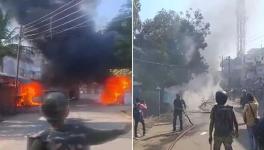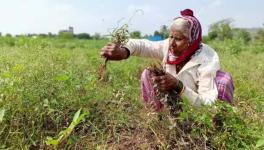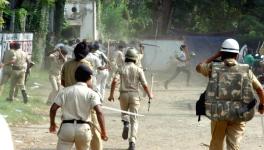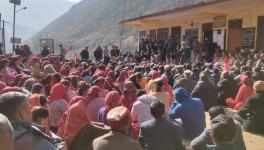Konkan Refinery: Stir Continues as Locals Fear Damage to Land, Ecology
New Delhi: The residents of Barsu-Solgaon and the adjoining eight villages in the Ratnagiri district of coastal Maharashtra intensified their protest as soon as the state government decided to proceed with the land survey process for the proposed oil refinery in the area.
Protests against the Konkan refinery project in the Barsu-Solgaon region are intensifying in the face of a crackdown by the government. Hundreds were detained, and several persons were arrested as the police reportedly lathi-charged and tear-gassed protestors, including several women.
The opposition to the proposed project is not new. However, it has intensified over the past week as a go-ahead was given to the soil survey of the region.
Initially proposed in 2015 in the Nanar region of Ratnagiri, the project is a joint venture between Saudi corporate giant Aramco and UAE’s national oil company in partnership with the Indian Oil Corporation, Bharat Petroleum, and Hindustan Petroleum. After an intense resistance movement in the region, the project was stalled and is now being planned 20 kilometres away in the Barsu region.
While the exact site for the planned project has not been declared, the soil survey has triggered mass protests by thousands across villages. The region is home to farmers and fisherfolk belonging to the Koli and Kunbi communities whose livelihood depends on cultivating cashews, mangoes, and horticulture.
Reportedly, the protesters organised a march at the site, where soil testing is ongoing, to press for their demand. However, the police used lathi charging and teargas to disperse crowds.
Speaking to NewsClick, Hrishikesh, activist and lawyer from the region, said, “Over 150 women protestors and main protestors were taken into custody and released at night; they were taken to different parts within the Ratnagiri district. The protestors' demands are the same as earlier -- we do not want any of these harmful projects in the Konkan region. The area is a serene natural area with ecological sensitivity, on which the farmers and fisherfolk are dependant. We do not want any projects to destroy the coast and the ecology of the region; we do not want any chemicals there. What is important to remember is that this is not merely about the refinery but also about the petrochemical project that will come up there.”
He added, “There is an effort to greenwash the project by calling it a “green project”. Even the claim that it will generate employment remains inflated and false, as we know from the example of other projects, such as the Jamnagar Refinery, locals end up getting tertiary jobs in these projects.”
The locals want hospitals, schools and facilities. However, the government cannot blackmail locals that the facilities will be built in the region only when projects such as these are approved.
Amid the protests, over 100 protestors have also faced arrests. They were produced in Rajapur court, from where they were released on bail.
Activists highlight that externment notices have also been sent to those protesting, and an attempt is being made to muzzle the voice of those resisting the corporate project. Speaking to NewsClick, activist Sachin Chavan said, “Currently, the government has not notified a particular place for the refinery, but they intend on doing so. They wanted to do the soil study for the notification to be generated.”
The locals did not allow government and company officials to carry equipment within the region. Amid this, Section 144 (of the Criminal Procedure Code) was imposed in the region. Moreover, several extrenment notices were reportedly served to activists from the region; currently, eight such notices have been served. This has taken place even as detentions and arrests of protestors are continuing.
In 1997, the Maharashtra government declared the Konkan region ecologically sensitive. However, mega projects such as the Ratnagiri refinery have consistently been proposed across regimes and have also witnessed opposition. The Ratnagiri Refinery and Petrochemical project came to a standstill because of protests over land acquisition.
The Maharashtra government, in an attempt to acquire land for the project, declared around 16,000 acres of land spanning across 16 villages as an ‘industrial zone’ for the project. Instead of the Land Acquisition Act of 2013, the land is being acquired under the Maharashtra Industrial Development Act of 1961.
A political tiff is also shaping up in Maharashtra as Udhav Thackrey, who proposed Barsu as a site for the project, has now extended his support to the protest. It has led to claims by the Eknath Shinde faction of the Shiv Sena that protests were being instigated at the behest of the Udhav Thackrey faction (Shiv Sena UBT). On the other hand, leaders such as Sanjay Raut of the Thackeray faction slammed the Shinde-Fadnavis government.
The author is an independent journalist.
Get the latest reports & analysis with people's perspective on Protests, movements & deep analytical videos, discussions of the current affairs in your Telegram app. Subscribe to NewsClick's Telegram channel & get Real-Time updates on stories, as they get published on our website.
























